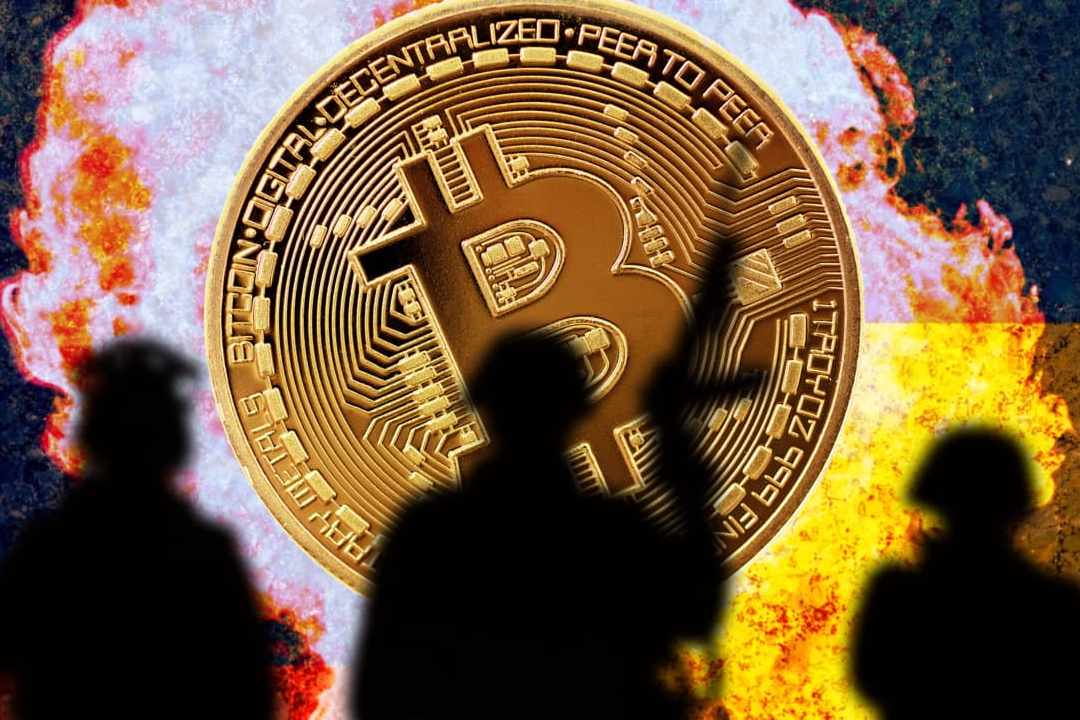The Effect of the Russian-Ukraine War on Cryptocurrency and Vice-Versa
It's no secret that war is expensive. Besides the monetary costs - lives lost, families devastated, and futures permanently altered. What about the war's other, less visible costs?
The last few weeks have been sobering moments for the world, and the cryptocurrency space has not been exempted. The Russian-Ukraine war took almost everyone by surprise, but the aftermath has not been that subtle. While the direct impact of the conflict may be felt more most in Ukraine, it has also sent shockwaves through the global digital currency markets.
The world was shocked when Vladimir Putin announced a special military operation in Ukraine. In the wake of the first attack, global markets responded accordingly, and the fragile American economy, which had been battling a 7% inflation rate, staggered. If there's anything we have learned, it is that conflicts have far-reaching consequences, no matter how local they may seem at first glance.
The US and the EU responded with tough economic sanctions targeted at crippling the Russian economy and isolating it from global commerce. By seizing several Russian foreign assets, looking for alternatives to Russian oil, and removing seven banks from the SWIFT network, the West made a bold statement showing that they would not allow any oppression to have a field day. On the other hand, Ukraine has enjoyed military aid from several countries and has received over $108m in donations across all government crypto accounts. What does this mean for cryptocurrency? And how has the cryptocurrency market fared since the start of the war?
In this article we will look at how the Russian-Ukraine war is affecting cryptocurrency—and how cryptocurrency may be impacting the war itself.
How Have Crypto-Assets Fared Since the War Started?
Since the Russian-Ukrainian war, investors have been pondering whether cryptocurrencies can provide safety from economic implications of this terrific event. The price of Bitcoin has been on an upward trend since the war started, gaining momentum near $42k two different times. People fear that fiat currencies will lose value, as we have seen with the Russian ruble, or that they can be seized at convenience, such as US Dollar. Therefore, it appears reasonable to treat decentralized digital currencies as a safe heaven that can’t be seized or otherwise controlled.
Let’s not forget about gold, though. When economies suffer from war or inflation, investors often turn towards precious metals because they retain their worth over time while still providing some protection against economic fluctuations. However, even though gold outperformed most other assets during last year’s crisis, it is different this time around.
As a result of Russia's attack on Ukraine, the price of Bitcoin dropped 8%, going below the $35,000 mark in the early hours of 24th February 2022, before climbing back up later in the afternoon. Other cryptocurrencies, such as Ethereum, Solana, and Cardano, were also down over the same period before gaining momentum.
Following the invasion, cryptocurrencies experienced a selloff that wiped off $150bn from the market cap, coinciding with the global equity market's decline. However, over 22% of major crypto coins rallied during the next seven days, including Bitcoin and Ethereum.
This might have reinforced the idea that crypto-assets are a safe haven as well as a store of value, irrespective of economic uncertainty.
The ongoing war shows that cryptocurrencies are carving a niche for themselves in the finance world, offering people an alternative to fiat currencies. While some countries, like the United States and Ukraine, are seemingly headed towards crypto-favorable regulations.
Further, the demand for Bitcoin in Russia and Ukraine has picked up, as cryptocurrencies are seen as a viable option for people looking to hedge risks against economic instability, as fiat currency in both countries is either rocked by war or economic sanctions.
How Russian-Ukraine War May Shape the Future of Global Finance
During Russia's invasion of Ukraine, the imposition of sanctions, ensuing financial market turmoil, and the involvement of cryptocurrencies such as Bitcoin have been a hot topic.
Alex Bornyakov, Ukraine's Deputy Minister of Digital Transformation, stated that using crypto instead of traditional banking institutions has made money transfers considerably faster and more flexible, emphasizing that time is critical in a war.
"Imagine a bank transfer, where you send money and then wait two or three days. In crypto, you just send the money, and the transaction is completed in five to ten minutes," Bornyakov said.
Let’s discuss how cryptocurrency has helped Ukraine, how Russia's attempt to circumvent sanctions using cryptocurrency may be a hoax, and how Ukraine has embraced cryptocurrencies in reaction to the war.
Ukraine Government Turns to Crypto
Cryptocurrencies are a popular way to exchange money across borders. The war between Russia and Ukraine has revealed one of its important features: its ability to facilitate fast, secure cross-border payments.
Crypto proved useful for the people of Ukraine, unlike traditional financial transactions. The country received over $4m in Bitcoin donations within 24hours of announcing on social media that it would accept global donations made in Bitcoin.
Ukraine moved rapidly when the war began, launching multiple crypto wallets (in less than 48 hours) to receive crypto donations from individuals and businesses to aid their troops and assist displaced residents around the country. Since then, they've received over $108 million in cryptocurrency donations across all government accounts.
FTX, Kuna, and Everstake partnered with the Ukrainian government to create a website that further helps with crypto donations. The website is expected to accept donations in 9 cryptocurrencies, which includes Bitcoin (BTC), Tether (USDT), Solana (SOL), Ethereum (ETH), Dogecoin (DOGE), Icon (ICX), Neo (NEO), Monero (XMR), and Polkadot (DOT).
In a time of tension, it's great to see the crypto community come together and support Ukraine. This innovation, however, has led some investors and regulators to think Russia could evade sanctions through cryptocurrency.
Could Russia Have Evaded Sanctions Using Cryptocurrency?
Seven Russian banks have been withdrawn from the SWIFT system, limiting their access to global financial markets. As a result, there has been discussion over whether cryptocurrencies, particularly Bitcoin, may be used by Russia to bypass the sanctions.
Most digital currencies, such as Bitcoin, are decentralized, which means they are neither issued nor controlled by a centralized institution. When crypto is transferred to other users, it bypasses the usual financial infrastructure. Because of the transparent nature of blockchain, it will be difficult to remain under the radar while moving the amount of cash needed to keep the Russian economy running via crypto.
It is vital to remember that owing to the inadequate liquidity, Russian corporations and billionaires will be unable to shift their money freely. Because cryptocurrency has a fraction of the liquidity of the global currency market, moving vast sums of money with it is challenging.
Ukraine Introduced New Crypto Law
The Ukrainian Government is hopeful that by creating a legal market for virtual assets today, the country's economy would be able to recover from the war. According to the blockchain analytics platform, Chainalysis, Ukraine has been one of the world's forerunners in terms of cryptocurrency adoption, ranking fourth.
Last week, Ukraine's President, Volodymyr Zelensky, passed a bill to help the country regulate cryptocurrency activity within its borders. The bill, "On Virtual Assets," requires crypto exchanges and corporations dealing with virtual assets to register with the Ukrainian government in order to function legally and, as a result, allows Ukrainian banks to create accounts for the corporations.
Bornyakov stated that the measure assured that the government's crypto fund was legal. It also meant to send "a significant statement to the world: that once the war is over, we're going to welcome all companies from across the globe to operate in Ukraine."
The National Securities and Stock Market Commission of Ukraine has the authority to determine the country's virtual asset policies, grant licenses to crypto businesses, and act as the sector's financial watchdog. This new law, according to the Ministry of Digital Transformation, is a significant step toward legalizing the crypto industry and developing virtual assets in the country.
It seems that Ukrainian leaders appreciate the help from the crypto community and want to provide something in return.
How Regular Citizens in Russia Are Using Crypto
When news of the invasion broke on February 24th, Russia's major stock index plummeted by 33%, the fifth-worst fall ever recorded, wiping out $189 billion off the market.
Since the invasion, Russia has been hit with several economic sanctions aimed at cutting the country off from the global financial system. The Russian ruble plunged to a historic low after some Russian banks were banned from the SWIFT financial system on Saturday. The US and the EU also agreed to freeze the Bank of Russia’s access to cash buffers built to lower reliance on international markets.
The Western move to seize Russian reserves has shown that the money you think is yours isn't really, and this should make people realize they need self-custodied alternatives like cryptocurrencies.
The sanctions have tremendously pressured Russia's fiat currency, the Ruble, presently trading at $1 = 106.65 rubles, compared to 74 rubles on February 13th. People in Russia have been forced to move money into cryptocurrencies to protect themselves from the huge depreciation of the ruble, and to facilitate cross-border transactions.
According to researcher CryptoCompare, trading volumes between the rouble and major cryptocurrencies reached 15.3 billion roubles ($140.7 million) on Monday, up threefold from a week earlier. The chart above shows that people were rushing in to trade Ruble for Tether, a leading stablecoin pegged to US Dollar.
As Ruble has dropped, many Russians have turned to cryptocurrency for survival, demonstrating unequivocally that cryptocurrency is one of the very few means of preserving wealth for them.
According to Noelle Acheson, Head of Market Insights at New York-based Genesis, the war has reinforced the idea that Bitcoin "is not merely a speculative asset, but also a seizure-resistant, policy-independent, longer-term store of value."
Takeaway
Cryptocurrencies have been seen as a way to hedge against political and economic uncertainty. As the Russian-Ukraine war drags on, it's clear that this war is also having an effect on cryptocurrency. In the midst of global sanctions and a crashing Ruble, people in Russia are turning to cryptocurrencies as a way to protect their wealth.
Ukraine, on the other hand, has legalized cryptocurrencies. This new law shows that Ukraine is ready to join the global crypto community and build a future with virtual assets.
Considering recent events, we can see that cryptocurrencies provide an alternative (not only) financial ecosystem that allows people to remain independent from governments’ actions, be it freezing of funds or cutting from the global financial networks.
In fact, if people were to start relying more on crypto than fiat, it would likely result in the demise of states as we know them today and create a new reality where tyrants and oppressors wouldn’t have sufficient means to sustain their sick ideas.
*This communication is intended as strictly informational, and nothing herein constitutes an offer or a recommendation to buy, sell, or retain any specific product, security or investment, or to utilise or refrain from utilising any particular service. The use of the products and services referred to herein may be subject to certain limitations in specific jurisdictions. This communication does not constitute and shall under no circumstances be deemed to constitute investment advice. This communication is not intended to constitute a public offering of securities within the meaning of any applicable legislation.




